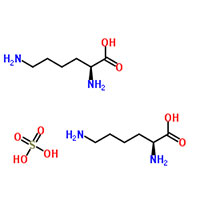



| N/A |
| Packing | |
|---|---|
| Storage | Powder -20°C 3 years 4°C 2 years;In solvent -80°C 6 months, -20°C 1 month |
| Shipping | Room temperature in continental US; may vary elsewhere |
Tel: 0086-25-52397805
Email: sales7@alchemist-chem.com

| Common Names | L-Lysine sulphate | ||
|---|---|---|---|
| Structure |  |
||
| CAS No. | 60343-69-3 | Boiling Point (℃) | N/A |
| Molecular Weight | 390.454 | Melting Point (℃) | N/A |
| Density | N/A | Vapor Specific Gravity | N/A |
| Molecular Formula | C12H30N4O8S | Flash Point (℃) | N/A |
| Solubility | N/A | Autoignition Temperature (℃) | N/A |
| Personal Protective Equipment | Eyeshields;Gloves;type N95 (US);type P1 (EN143) respirator filter | ||
|---|---|---|---|
| Hazard Codes | T+:Very toxic | ||
| Safety Phrases | S1-S28-S45 | ||
| RIDADR | NONH for all modes of transport | ||
| WGK Germany |